GOSPEL in the PARTNERSHIP



CBFNC’S MINISTERIAL TRANSITIONS TEAM is hosting bi-weekly Zoom conversations designed as shared learning experiences for representatives from search teams across our state. Conversations will be held the second and fourth Mondays at 6:30 p.m. with a specific topical focus. These calls are designed for 2–3 members of a given search team to participate.

3 Partnership in the Gospel

5 Cracking the Young Adult Conundrum
7 Church Resource Corner
8 Churches Cross Denominational Lines to “Revive All” in Their City
10 First Baptist of Marion’s Enduring Partnership in Belize
12 CBFNC Partners With Field Personnel Through Grants
13 FBC Mount Olive Honored With CBF Mission Excellence Award
15 Gifts and Ministers on the Move

This article is the third in a series on CBFNC’s organizational values. In this issue we focus on Collaborative Partnerships: We respect the calling and passions of other Christians (individuals, congregations, organizations and institutions) and commit to minister with them as mutual partners, actively working together to pursue a common mission.
CBF: The partnership model extends to CBF organizations — CBF Global and SROs (state and regional organizations). CBF is not one organization but many. SROs are not subsidiaries of CBF Global. Each is a separate 501(c)(3) entity with its own governance and finances. Yet we share a common heritage, value system and identity. We voluntarily work together in pursuit of God’s mission.
In the opening verses of his letter to the Philippians, Paul describes his relationship with these dear Christian colleagues as a “partnership in the Gospel” (1:5). Partnership, with God and the people of God, to pursue God’s mission in the world, is a concept that can be seen throughout Scripture.
It’s been said that partnership is part of the “CBF DNA.” From the founding of the CBF movement, partnership — both the word and the concept — has been pervasive. Perhaps no place in CBF life has partnership been practiced more faithfully and effectively than in CBF North Carolina.
Individuals: Organizations are made up of people and people are where partnership begins. People partner with CBFNC and through CBFNC to pursue Gospel ministry. Some of these individuals are also part of churches and other organizations, and some of them are simply individual participants and supporters.
Churches: CBFNC’s relationship with churches is one of partnership. Churches are not subsidiaries or franchises of CBFNC. Like individuals, they partner with CBFNC and they partner through CBFNC to collaborate with others. CBFNC seeks to equip churches to minister locally and beyond their communities, and to extend the mission of churches in places and areas where they do not have the capacity to minister directly.
Organizations and Institutions: CBFNC doesn’t own and operate other ministries but we do partner with those who share our values and mission. These partnerships are mutually beneficial. We support one another. That is, CBFNC believes in and supports the mission of our organizational partners; and, partners support CBFNC and its constituents — individuals and churches.
Partnership involves much more than money, but the financial dimension is very important. One theologian has said, “Money is personality in portable form” (T.A. Kantonen, “A Theology for Christian Stewardship”). Sharing of resources strengthens relationships and solidifies commitments.
Though CBFNC’s ministries are financed through several funding streams, the gifts of individuals and churches are paramount. In return, a part of CBFNC’s mission is to support individuals and churches through various ministries.
CBFNC also provides significant financial support for ministry partners. In fact, CBFNC is a leader in the CBF world in partner funding. Our partner funding strategy includes traditional North Carolina Baptist organizations as well as those that are widely supported by other CBF organizations.
Congregations are CBFNC’s largest source of funding. Because of the financial stresses impacting congregations, partner funding will likely decrease in the future. But we will remain committed to supporting our cherished partners and we will not cede our leadership role in the CBF community.
In an earlier Baptist era, denominational organizations often owned related ministry organizations. They operated under a “funding and governance” model. That is, they provided significant funding and they exercised complete governance over the organization. They provided financial support and in return were granted authority. It was a parent-child relationship. They even viewed congregations in this way; as if congregations couldn’t be trusted to make good decisions but needed the firm disciplinary hand of parents.
CBFNC has never operated with this model. In our partnership model, we relate not as a parent to children, but as adult siblings. Whether relating to churches, ministry partners or other CBF organizations, we are all children of
God and adult siblings in God’s family. We voluntarily cooperate without coercion. We agree on the most important things but respect differences. We support one another without being codependent. We share counsel when asked but don’t intervene in another’s internal affairs.
Ultimately, our partnership ministries support CBFNC’s larger mission of bringing Baptists together for Christcentered ministry. As we look around at every aspect of our fellowship — individuals, churches and organizations, we joyfully proclaim with Paul:
“I thank my God every time I remember you. In all my prayers for all of you, I always pray with joy because of your partnership in the Gospel from the first day until now, being confident of this, that he who began a good work in you will carry it on to completion until the day of Christ Jesus” (Philippians 1:3-6).
CBFNC’s primary partners are the churches and individuals who comprise our fellowship. We recognize that we can’t do the work of fulfilling God’s mission in the world alone, therefore we have significant relationships with other ministry partners who resource churches and/or extend our mission. In fact, CBFNC has almost 30 partners that are funded in our budget and we are the largest single funder of partners in the entire CBF network. Below is the list of partners currently funded by CBFNC:
Baptist History and Heritage Society
Baptist News Global
Baptist Joint Committee for Religious Liberty
Good Faith Media
North American Baptist Fellowship
Atrium Health Wake Forest Baptist/ Faith Health Ministries
Baptist Women in Ministry of North Carolina
Baptist Women in Ministry National
Center for Healthy Churches
North Carolina Baptist Foundation
Campbell University
Chowan University
Gardner-Webb University
Mars Hill University
Meredith College
Wingate University
Campus Ministries on Historically Baptist Campuses
Campbell Divinity School
Duke Divinity School/Baptist House of Studies
Gardner-Webb University School of Divinity
Wake Forest University School of Divinity
Baptist Children’s Homes of NC
Baptist Retirement Homes
Baptists on Mission NC Baptist World Alliance
Christian Men’s/Women’s Job Corps of NC
Passport, Inc.
Woman’s Missionary Union of NC
For a decade-plus, the most common question churchgoers have asked me in my various roles as CBF Global’s Church Start specialist, the pastor of a new church (Mosaic Church of Clayton) and now as the overseer of CBF North Carolina’s existing and emerging young adult ministries, is “How do we reach young people?”
As we settle into the 2020s, we are entering uncharted territory regarding young adults and their relationship with the established church. A 2022 poll from the Survey Center on American Life found before the COVID-19 pandemic, 70% of religiously affiliated young adults attended worship. However, in the spring of 2022, only 57% still attended.
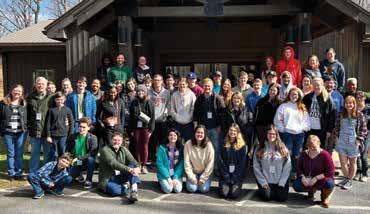

When you compound these trends with recent projections from Pew Research (that Christians of all ages will
experience was disengaging, uninteresting, and irrelevant to his life and concerns for the world.
By Andy Hale CBFNC Associate Executive Coordinator
And this is where many stumble in understanding why young adults are not in the pews on Sunday morning. Most young adults are not leaving the church because they are abandoning their faith. Instead, many are earnestly wrestling with their Jesus-centered convictions, the problems of our culture and world, and their struggles with how they perceive the local church failing to respond, adapt and open itself to new possibilities.
There is something about the current generational gaps that are different from eras before. In my recent CBF podcast interview with Dr. Elizabeth Corrie, the Candler
shrink from 64% to 54–35% of all Americans by 2070 and the “nones” population will rise from 30% to 34–52%), it is easy to understand why the church might feel unsettled about connecting with young adults.
The church’s challenges of connecting with young people are nothing new. Do you recall the story of the young man Eutychus from Acts 20? The Apostle Paul, according to verses 7–9, kept preaching and preaching and preaching, eventually leading Eutychus quite literally to fall asleep out of a window to his death. And while the young man was resurrected from the dead, we can draw this exact exegetical truth: Yep, even ancient young people thought church was soooooooooooo boring.
The Eutychus plummet incident does raise a fascinating dialogue about generational differences within the church. Sure, the young man could have had a long day at work, leading to him slipping off into a deep and departing sleep. But equally as likely, he might have felt the church
School of Theology’s professor in the practice of youth education, she urged churches to consider the following:
The youth with whom we work may not be seeking to overthrow dictators or lead global movements, but they are yearning to free themselves from white supremacy, ephebiphobia, gender norms that control and objectify their bodies, educational policies that destroy their self-esteem and love of learning, ecclesial practices that discount them as full members of the Body of Christ, and economic policies that destroy their environment and saddle them with debt.
Suppose you started to roll your eyes at any point while reading the last paragraph. In that case, you are not alone because it is typically right here that most people check out of the conversation or draw dividing conclusions believing this all comes down to identity politics or disagreements around socio-political issues.
But two fundamental underlying cognitive and social
biases are at work that prevent us from having genuine dialogue around generational gaps:
1. Generationism, the belief that some generations are superior to others.
2. Belief Perseverance, the inability of people to change their own belief even upon receiving new information or facts that contradict or refute that belief.
These are two technical terms that explain the old adage, “When I was your age, I had to walk to school backward up two mountains in a snowstorm during the dead of summer” or “Ok, Boomer.”
If we are genuinely interested in reaching young adults, we need to understand their lived reality. This generation of young adults is coming into adulthood at the intersection of emerging global changes (post-9/11, multiple financial crises, MeToo and ChurchToo movements, challenging conversations around racism, the COVID-19 pandemic, January 6, 2020, rapid technological changes, etc.) and extreme economic, political and cultural division.
As it has always been, the current 18–30-year-olds are dealing with the decisions made by the generation before them with tremendous consequences, including severe college debt, inadequate savings and retirement plans, low levels of home ownership, the growing cost of health care, delay of marriage and parenthood and on and on. According to Pew Research, young adults are reaching key life milestones later than they did 40 years ago.
It is no wonder that this generation of young adults is a large portion of what is being called a mental health epidemic. A study from Kaiser Family Foundation found that 52% of young adults said they’d always or often felt anxious, while 33% felt depressed or 32% lonely in the last year.
Suppose you and your congregation are interested in cracking the young adult conundrum. In that case, your first critical step is taking the time to genuinely understand this generation with a sense of openness, humility and adaptability.
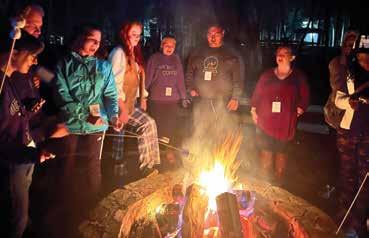
The problems that young adults see within the church, communities, culture, politics and globe matter to them on a deeply spiritual level. As the older generation, we cannot inherit the mindset of our forebearers that saw such things with a condescending attitude of “you’ll understand when you get older.” If the church continues to avoid discussing these matters, we will continue to miss large swaths of the young adult population.
Are there young adults in your or your church’s sphere of influence? Are members of your congregation taking time to actively listen to them with a sense of openness to understand what makes their lived experience different than your own, expressing authentic empathy and reflecting on how the church can embody the Spirit’s innovation in building relationships with them? Note: Active listening does not require a rebuttal, nor does it require uncompromising change.
If not, now is the perfect time to take the first critical step of genuine understanding. Journey with CBFNC as we work alongside congregations, campus ministries, ministers, and young adults to nurture and empower healthy intergenerational expressions.

• Generations: The Real Differences Between Gen Z, Millennials, Gen X, Boomers, and Silents―and What They Mean for America’s Future by Jean M. Twenge
• Generations Reimagined by Amanda Lisetti
• The Coddling of the American Mind: How Good Intentions and Bad Ideas Are Setting Up a Generation for Failure by Greg Lukianoff
& Jonathan Haidt• Youth Ministry as Peace Education: Overcoming Silence, Transforming Violence by Elizabeth Corrie
As part of our mission to equip and assist churches, we track issues common to congregations around the state. The most significant current legal topic relates to tax-exempt status. Specifically, churches seeking to confirm their tax-exempt status or any legal steps that may be required. This issue is most often raised by churches who may have changed denominational relationships in recent years.
This summary includes what should be positive news for churches regarding tax-exempt status regardless of denominational affiliation. In addition, the summary addresses a closely related topic, church incorporation. This document is intended as a practical overview and additional support is available (see below).
FAQ #1: Should our church be incorporated?
• While church incorporation is not legally required, it is a best practice. Most partner churches of CBFNC are organized as nonprofit corporations under NC law. Incorporation confirms nonprofit status under state law and also provides churches with structure and protection, including liability.
• If your church is not certain about its incorporation status, confirmation can easily be determined through the NC Secretary of State’s online database. If the church determines that it needs to file for formal status, that process is neither complex or costly.
FAQ #2: Is our church tax-exempt?
• Yes! Under longstanding federal rules, a church meets the requirements of section 501(c) (3) of the Internal Revenue Code such that it is automatically considered tax-exempt and is not required to apply for and obtain formal recognition of exempt status from the IRS. For more information, this section from IRS.gov outlines and affirms the automatic status.
• Churches are similarly exempt under state law, with no further action required.
By Jason Cogdill CBFNC Legal Resource Partner
FAQ #3: If our church is automatically taxexempt and does not require an IRS application, do we also need to confirm IRS 501(c) (3) status through a denominational partner?
• No. This is an area of long-term confusion for many churches. While it is true that a parent/umbrella nonprofit organization can apply to the IRS and receive a Group Exemption Letter that confirms tax-exempt status of the parent’s affiliated entities, this approach is not required for churches. Even if your church has/had a copy of a Group Exemption Letter from a state or national organization, the letter is/was not required to confirm the church’s tax-exempt status. The law has not changed, but communication from different denominational entities has confused the issue over time.
• Acknowledging the above, we realize that on certain occasions a church may wish to have support from a denominational partner that is a formally approved (non-automatic) 501(c)(3) entity. Example: A church is receiving or applying for a grant from a missions foundation, and the organization asks for a formal letter confirming 501(c)(3) status. In our view, the church can (a) confirm its status independently as a tax-exempt entity, and, if helpful, (b) use a letter from CBFNC confirming the church’s status on its own and as an active, cooperating ministry partner of CBFNC.
• For a customized partner letter of support from CBFNC, contact Jason Cogdill at legal@cbfnc.org.
Acknowledgment of Prior Guidance from CBFNC: In 2007, one of CBFNC’s long-time lay leaders, Don Horton Sr. of Zebulon Baptist Church, published written guidance for partner churches regarding these issues. If your church consulted CBFNC around that time or otherwise relied on that information, know that the guidance remains accurate in 2023 as it was at the time of publication. We acknowledge Don’s leadership on this topic, which is an example of the quality of leadership that CBFNC lay leaders and staff have long provided and upon which we seek to build and grow.


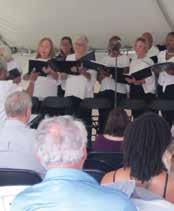

“Hallelujah, Thine the glory! Hallelujah, Amen! Hallelujah, Thine the glory! Revive us again!” In May 2023, these words echoed through the downtown streets of Fayetteville, North Carolina. They were sung as they have been for generations of Baptists in the south: outdoors, under a tent, and among folding chairs. Yet this time, something was different. Something unseen in the religious memory of each member of this tent-revival congregation. Something as unlikely as it is needed in a post-pandemic world where divisiveness seems to be woven daily into the fabric of every aspect of our lives.
For a week, the voices singing out to God for revival from beneath that tent came from members and pastors of far more than just the First Baptist Church, the building in whose shadow that tent sat. They were the united voices of neighbors, seekers and God’s people from many churches in the city. Presbyterian voices, Roman Catholic voices, African Methodist Episcopal voices, Lutheran voices, United Methodist voices, African-American Pentecostal voices, Episcopalian voices, and Lumbee Indian voices. The voices of the young and the old. The homeless and the housed. All seeking more than revival — but for God to Revive All. All of the division. All of the brokenness. All of the hearts and lives torn apart by the years of isolation and fear that COVID wrought.
What our city heard for those eight days were the sounds of Heaven; because I am convinced that Heaven is not divided by denomination.
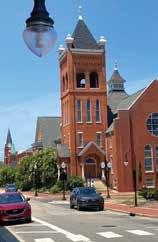
We called this event the Revive All — a week of faith, renewal and prayer for ALL of those reaching out to God for hope.
Every evening, this united congregation called out to God seeking revival for a specific need, making each service a dramatically different experience from one another. One night focused on asking God to revive joy in worship and included bagpipes, liturgical dancing, a community art project and a community choir.
Another focused on the need for revival in sharing faith with children and featured bouncy houses, snow cones, a youth praise band and a sermon directed at both children and adults from Rev. Sarah Mears, the associate pastor of children and families and communication at Hayes Barton Baptist in Raleigh.

One night was a memorial service officiated by a local hospital chaplain where participants were invited to grieve all that went ungrieved throughout the pandemic, from the loss of family members to the loss of life experiences such as in-person graduations or weddings.
There was a night seeking the revival of community featuring author and preacher Jonathan Wilson-Hartgrove and a night focusing on reviving the unity between churches which included a sermon preached by eight ministers from eight different denominations.
On the Saturday of the Revive All, participants sought God’s revival of missionary service by gathering
By Rob James Pastor, First Baptist, Fayettevilleinto teams and blanketing the city of Fayetteville with love by volunteering at local food banks, homeless shelters, providing community clean-ups and participating in a building project through Habitat for Humanity.
“I and the members of Hay Street United Methodist were deeply grateful for the spirit of Christian unity that was on display that week and the opportunity to meet new friends in Christ and in some cases, rekindle old friendships,” said David Woodhouse, pastor of Hay Street United Methodist Church.
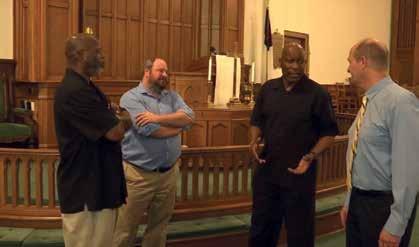
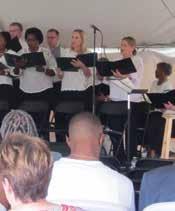
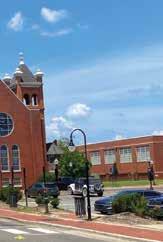
“It was great to see multiple races, backgrounds and ages talk about real issues like grieving and mental health and finding community and connection. The gaps between us often stop us from engaging. The Revive All was wall breaking. There were people from all over the community, including our neighbors experiencing homelessness. They came and they stayed,” said Sonny Kelly, co-youth minister of One Church Covenant Fellowship.
“With the Revive All, we saw the possibilities: possibilities for inter-congregational, ecumenical and neighborliness among God’s people. It showed what happens when we set aside thoughts like, ‘it’s not us and that is not what we do.’ I came away knowing seven or eight other pastors I did not know before,” said John Locke, pastor of St. James Lutheran Church.
The idea for the Revive All emerged through the combined prayers of 11 members of First Baptist — a group diverse in age, race, political affiliation and faith experiences. For months we gathered to pray together; to dream together; and to listen together for what God’s Holy Spirit might be leading us to do in the face of a
post-pandemic world of increased need and increasingly empty pews.
Revive All was a God-sized dream that took not only our congregation but the congregations of so many to realize. It took months of planning, fundraising and a grant from both the North Carolina Conference of The United Methodist Church and a Missions Engagement Grant from CBFNC.
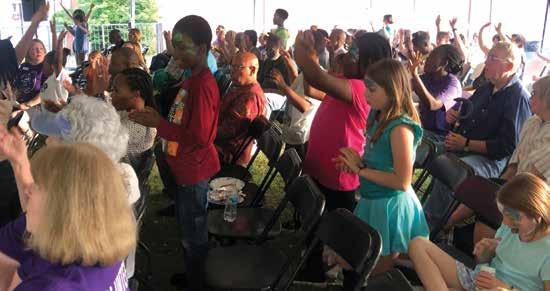

The Revive All was something our community needed to see; it was something I needed to see. I feel revived. Out of the dark cloud that seemed to linger over everything since the pandemic began has emerged a new spirit of possibility and hope. It was a reminder that God is still moving in Fayetteville. And The Revive All was just the beginning.
The Missions Engagement Grant Fund is for CBFNC churches that seek to network other congregations, organizations and communities for the purpose of sharing God’s love by providing help, hope and friendship and combining assets to further the kingdom of God. An element of partnership is required with community organizations and other churches of any denomination to receive the grant. Our Missions Engagement Team, made up of clergy and laity from across our state, reviews each request and makes awards based on the fulfillment of the stated purpose and availability of funds at the time of the request. For more information visit our website or contact Mary Kaylor, mkaylor@cbfnc.org.
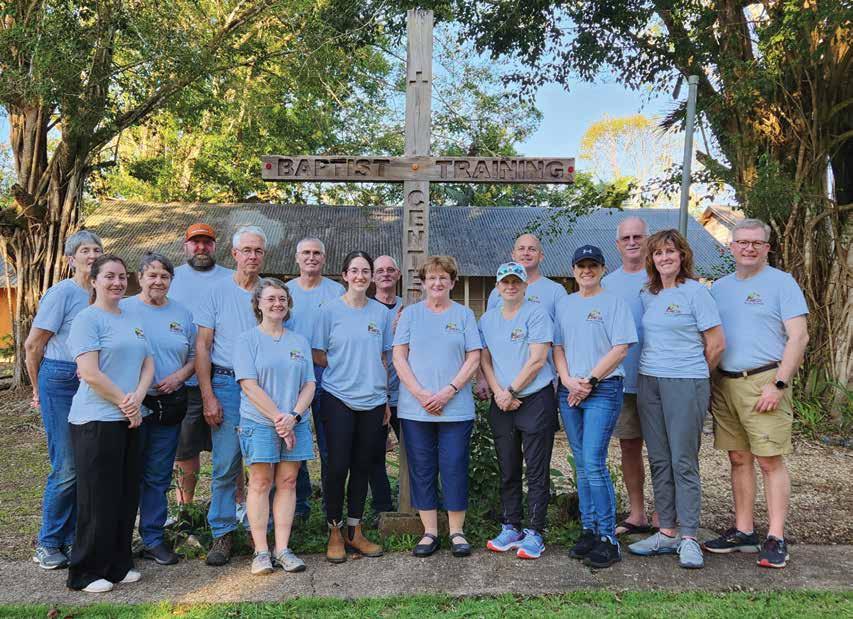
Many CBFNC congregations have sent mission teams to Belize, especially during the time when a formal partnership existed with the Baptist Association of Belize. Most of those groups stayed at the Baptist Training Center (BTC) in Camelote, just outside of the capital of Belmopan. The BTC has multiple buildings that include various types of accommodations, meeting spaces, two kitchens, a tool shed with a wealth of needed equipment, athletic fields and a children’s playground, all set on lovely park-like grounds.
Because of the partnership that began over 20 years ago between CBFNC, First Baptist in Lexington and the Baptist Association of Belize, First Baptist Church of Marion has been taking mission teams there since 2005. Our church initially committed to five years of missions in Belize because we believe that consistent partnership is more beneficial than one-time missions. But we developed deep and lasting relationships with the people there and so we have remained committed to this partnership.
The makeup of our teams over the years is also a great expression of partnership. Our teams have consisted of
members of other CBFNC churches such as FBC Lexington and Trinity Baptist in Raleigh, as well as non-church members from throughout our region.
During our trips to Belize, our ministry has included construction, medical and dental, agriculture, music and Bible schools. The BTC has become not only a practical, cost-effective place to stay while in Belize, but also a place of retreat, peace and fellowship. In short, the BTC has become our home away from home as our church has been sending a mission team each year until 2020 when the pandemic halted travel.
By Scott Hagaman Pastor FirstSadly, during the pandemic, the BTC went broke and fell into disrepair with no teams or revenue. Also, the camp’s longtime caretaker and director, Emmanuel “Heman” Salam, died after a long illness. The BTC, a nonprofit organization, has now been transferred to Casa de Shalom (House of Peace), a mission of Santa Elena Baptist Church. Under new ownership, the BTC continues to operate as before. However, part of the land will be developed
 Baptist, Marion
Baptist, Marion
into a home for disabled children, a much-needed ministry in Belize.


FBC Marion was excited to be able to send a team once again to Belize in February of this year. It was our first trip back since February of 2020. This year’s Belize Mission Team consisted of 16 adults, ranging in ages from 23 to 74. Our mission was construction at Santa Elena Baptist Primary School and repairs at the Western District Baptist Training Center (BTC) in Camelote. Our group was the first non-Belizean mission team to stay and work at the Baptist Training Center since the pandemic began in March 2020.
By God’s grace and our church’s support, our team was able to accomplish:
• Building a new guard house and painting the Santa Elena Baptist Primary School.
• Removing and replacing the 40-year-old zinc corrugated roof on the Blue Lodge at the BTC.
• Repairing and painting walls of guest rooms in the BTC Blue Lodge that had been previously infested with carpenter bees.
• Donating $380 to the BTC to complete bathroom shower repairs in the Blue Lodge.
• Donating $200 to aid the children’s food ministry at Camelote Baptist Church.
• Donating $100 for the ministry at New Jerusalem Baptist Church in Benque Viejo.
• Gifting $100 to support the interim administrator at the BTC.
• Visiting numerous friends and pastors from 17 years of past mission partnerships in Belize.
• Total ministry investment was $8,101, which had been previously raised through FBC’s Belize fundraisers.
We are thrilled that the BTC is now in good repair and ready to welcome U.S. teams once again. Groups are needed to attend to ongoing maintenance at the camp as well as the development of Casa de Shalom Children’s Home.
The churches of Belize continue to recover from the pandemic’s hardships. They are eager to welcome mission
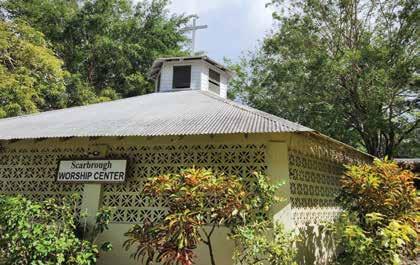
teams and establish partnerships to advance the gospel in Belize.
If you and/or your church are interested in sending a mission team to Belize and staying at the Baptist Training Center, please contact Jomie Salam at belizebtc@gmail. com or call her at 011-501-615-0440. Rev. Henry Baizar, executive director of The Baptist Association of Belize, is also available to help make ministry connections with local churches. He may be reached at drakebz@yahoo.com.
 By Mary Kaylor CBFNC Associate Coordinator
By Mary Kaylor CBFNC Associate Coordinator


The CBFNC Missions Engagement Team, whose members are both clergy and laity from across North Carolina, have awarded a total of $20,000 in Global Partnership Grants to five CBF field personnel for the 2023–2024 fiscal year.
Thanks to contributions from churches and individuals, CBFNC is able to include this line item grant fund in its budget. We recognize that field personnel are responsible for raising all of the funds needed to implement their ministries and CBFNC is happy to be able to come alongside their work and provide financial support through this grant fund.
This year’s grant recipients are:
• Anna Anderson
CBFNC partners with CBF field personnel in a number of ways in order to extend God’s mission in our state and world. One of the most tangible expressions of this partnership is through financial support from CBFNC’s Global Partnership Grant fund.

The Global Partnership Grant is a budgeted grant fund and awards are made annually. Applications are accepted each year by invitation and in accordance with funding availability. These grants seek to network CBF field personnel, congregations and communities to build long-term relationships and combine assets to further the kingdom of God.
• Stella Perrin
• Mina & Gennady Podgaisky
• Eddy & Cindy Ruble
• Delores Stimpson

These field personnel represent ministries in North Carolina, Cyprus, Ukraine and Indonesia. We pray that these funds will enrich each ministry as our field personnel share the love and compassion of Jesus Christ with people across our state and world.
Anna Anderson serves in eastern NC. Grant funds will allow Anna to further the impact of the ministry of The Gathering Place in Ahoskie with needed renovations. The Gathering Place houses the Roanoke Chowan Christian Women’s Job Corps, the Ahoskie Food Pantry, a clothing closet and household goods for those in need.
Stella Perrin was commissioned as field personnel this summer at the CBF General Assembly and will be serving in Larnaca, Cyprus. Grant funds will allow Stella to partner with All4Aid in ministering with the large number of unaccompanied minors currently living in the city. As a mental health educator, Stella looks forward to providing mental healthcare and support for these children and youth.
Delores Stimpson was commissioned as a Global Service Corps post-career field personnel this summer at the CBF General Assembly. She is serving in Durham with the Welcome House ministry of the triangle west region. Grant funds will allow Delores to provide caring and loving relationships with refugee families, while emphasizing belonging. She plans to host events within the region that will establish a presence to increase community awareness of the Welcome House ministry, increase support for Welcome House families as neighbors and renew the confidence that these families are a part of the local area.

During the CBF Global General Assembly in Atlanta in June, three churches were honored with the Mission Excellence Award for exceptional ministry in their communities and around the world. First Baptist in Mount Olive, NC, a CBFNC partner church, was one of the churches honored.
First Baptist Church in Mount Olive uses their time and resources to faithfully follow God’s call to transforming community. The congregation regularly invests in local households, schools and international communities to meet practical needs. They participate in a wide variety of mission work that is a testament to the hospitality of Christ.
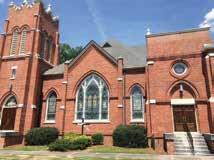
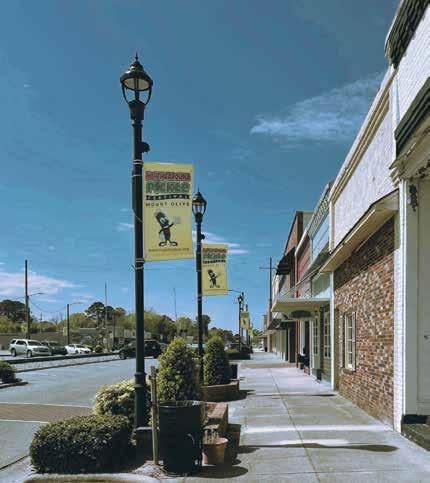
When the church was left a piece of property years ago, they rented it to a solar farming company. With these funds, “The Gratitude Project” was born. Now a $100,000 grant-based program, The Gratitude Project accepts proposals for sustainable community projects in Mt. Olive.
So far, awarded proposals include a children’s music program for low- income families, a children’s learning lab and a faith-based youth football program. FBC Mt. Olive also accepted the invitation to serve as a pop-up food bank market distribution site, and continues to embrace the potential of their congregation to engage in God’s mission.
Congratulations to FBC Mount Olive! Learn more about The Gratitude Project at www.fbcgratitude.org.

Eddy & Cindy Ruble serve in Indonesia. Grant funds will allow the Rubles to partner with the Union of Indonesian Baptist Churches relief and development programs to increase the daily protein and nutrition consumption among those living in extreme poverty in the Eastern Indonesian islands. Several trainings will be hosted on cultivation, harvesting and cooking of moringa, an extremely protein and vitamin-rich plant that grows abundantly and easily throughout tropical regions, as well as Sunday School activities for children, to provide spiritual nourishment as well as introduce them to healthy snacks and eating.
Mina & Gennady Podgaisky continue their ministry in Ukraine while they remain stateside due to the Russo-Ukrainian War. Grant funds will allow the Podgaiskys to partner with Kyiv Christian Academy and provide much needed heating supplies. Because of the war, enrollment will drop significantly and the school will have less funds to cover the costs for the heating system for the upcoming winter.
Please join CBFNC in offering your prayers of support for these field personnel and their ministries.


Scott Hagaman for celebrating 20 years as senior pastor at First Baptist Church, Marion.

can plant seeds of blessing, hope, & help.
Designate a gift for scholarships, new church starts, or where it is most needed. Please remember CBFNC in your will or estate plan.
For more information, contact Jim Hylton at (336) 759-3456 or finance@cbfnc.org.
Gifts from individual supporters established this endowment fund to supplement the CBFNC annual operating budget. Gifts to this fund assist all areas of CBFNC ministry as we strive to join the work of God in the world.
May – July 2023
Karl Jennings in honor of Jeff Spargo
Sarah Lester in honor of Davis Collier
Sarah and Peter Mariani in honor of Rebecca Husband Maynard
Lane Rice in honor of Phil Campbell
Ed Beddingfield in memory of Sarah Beddingfield
Karen and Mark Ingram in memory of James Ingram
Linda and Christopher White in memory of Kay Huggins
Barbara Sue and Gary Wikstrom in memory of Robert Person and Steve Montgomery
in Wilmington on its centennial anniversary! Thanks be to God for 100 years of Temple Baptist's presence and ministry on the NC coast.
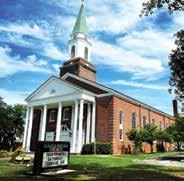
Our encouragement and support go to the following ministers who have recently moved:
Stan Elliott to St. John’s Baptist, Raleigh as Pastor
Caleb Foust to Piney Grove Baptist, Mount Airy as Pastor
Paul Gilliam to Winter Park Baptist, Wilmington as Pastor
Josh Godwin to First Baptist, Wilmington as Minister to Students
Aaron Hinton to Poplar Springs Baptist, Shelby as Pastor
Bob Stillerman to Millbrook Baptist, Raleigh as Pastor
Doug Vancil to Knollwood Baptist, Winston-Salem as Music Associate & Organist and Interim Congregational Associate

Kelsey Lewis Vincent to First Baptist, Wilson as Associate Pastor of Students and Connections
Chris Wilson to Warrenton Baptist, Warrenton as Pastor
When you make a move or know someone who has changed places of ministry, please email ahale@cbfnc.org. For assistance with transitions, visit cbfnc.org/transitions or call us at 336.759.3456.
www.cbfnc.org
Bringing Baptists of North Carolina Together for Christ-Centered Ministry
2640 Reynolda Road
Winston-Salem, NC 27106
OCTOBER
— PROCESO DE BÚSQUEDA DE MINISTROS
CONVERSACIONES
Online
October 9
YOUTH BEACH RETREAT
— RETIRO JUVENIL EN LA PLAYA
Fort Caswell
October 13-15
GROWING YOUNG 2-DAY WORKSHOP
— TALLER DE 2 DÍAS PARA JÓVENES
EN CRECIMIENTO
Trinity Baptist, Raleigh
October 16-17
MINISTER SEARCH PROCESS CONVERSATIONS
— PROCESO DE BÚSQUEDA DE MINISTROS CONVERSACIONES
Online
October 23
RETIRO DE MATRIMONIOS PASTORALES
—PASTORAL MARRIAGE RETREAT
Greensboro/Raleigh
October 27–28
NOVEMBER
— PROCESO DE BÚSQUEDA DE MINISTROS CONVERSACIONES
Online
November 13
MINISTER SEARCH PROCESS CONVERSATIONS
— PROCESO DE BÚSQUEDA DE MINISTROS CONVERSACIONES
Online
November 27
SAVE THE DATE
for the 2024 Annual Gathering
Celebrating 30 years of CBFNC!
March 14–15, 2024
First Baptist, Greensboro